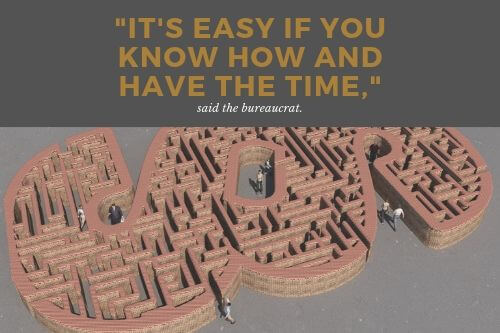
YouTube / iTunes / Spotify / Radio Public / Pocket Casts / Google Podcasts / Breaker / Overcast
Listen to ArtisanEnglish.jp posts & lesson intros here.
Word of the Day: Bureaucrat
Ask a young child what they want to be when they grow up, and they’ll tell you they want to be a firefighter or a race car driver.
None of them will say, “I want to be a bureaucrat.”
A bureaucrat is often thought of as a faceless government worker who follows a fixed routine and never thinks for themselves.
Children automatically go to the most exciting job they can think of.
I suppose it’s human nature.
We crave stimulation and adventure.
Referring to someone as a bureaucrat is often not a compliment.
They are often considered faceless government wonks who follow a fixed routine and never think for themselves.
They are seen as the creators of endless reams of red tape, and that’s the extent of their inspiration.
Bureaucrats have always been this way.
My favourite author, Charles Dickens, wrote about them in his novel, Little Dorrit.
He created a fictional government department called the Circumlocution Office.
Circumlocution means to be intentionally vague and never direct.
Anybody who has ever tried to get an immediate and straightforward answer from city hall will immediately understand the joke.
At the Circumlocution Office, it took years and years to get anything done.
If you ever wanted a bureaucrat to do something quickly, you’d have to hurry up and wait, as the Americans say.
No child wants to grow up to be a bureaucrat.
A lucky child has never met a bureaucrat and doesn’t know what one is.
I’ve recently been reading about Dr. Livingston and his explorations in Africa, which was then known as the Dark Continent, a place of mystery and danger.
Of course, the exploitation of Africa and its inhabitants was and still is a terrible thing, but the sense of adventure still lives in humans to this day.
We all dream of working in exciting jobs as explorers, fighter pilots, astronauts or police officers.
Unfortunately, some of us grow up to become English teachers or bureaucrats – there’s no danger there.
Unless you consider nasty papercuts to be a hazard.
Flesch-Kincaid Readability Test
This post is understandable by someone with at least an 8th-grade education (age 13 – 14).
On the Flesch-Kincaid reading-ease test, this post scores 63.
The easier a passage is to read, the higher the score on a scale of 0 – 100.

